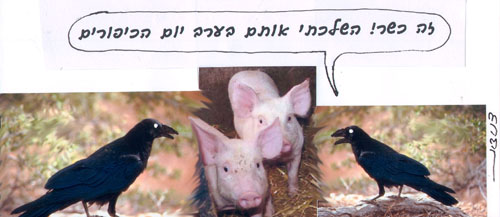
An incident occurred involving Rav Nachman, who went to visit his colleague Rav Kahana on the eve of Yom Kippur. Crows came and dropped pieces of liver and kidneys from their mouths. Rav Nachman told Rav Kahana that these pieces of meat were kosher and permitted for consumption, for on the eve of Yom Kippur, in preparation for the pre-holiday meal, Jews eat a lot of meat, and we can assume that the pieces of meat came from a kosher household. There was an incident involving Rav Chiya son of Avin, who lost the end of a kosher animal’s intestines between some barrels. His teach Rav Huna said that if he had some sign on the end of the intestines he could eat them when they were found, and if not, he was forbidden to eat them, lest they be the end of some other, non-kosher intestines. Rav added that if there is no sign on the intestines but one can recognize them, they are permissible for consumption. One of the sages. Rava, said that recognizing it is better than any sign, and proof of this is that a blind man is permitted to have sex with his wife and we do not fear that another woman has taken her place. You see that we rely on recognition of the wife’s voice, and similarly we rely on visual recognition. Similarly, men are permitted to have sex with their wives in the dark, for we rely on their recognition of their wives’ voices; this shows that recognition is preferable to signs, for we rely on it even when it comes to questions of adultery. The sage Rav Isaac son of Mesharshiya gave support to the argument that recognition is preferable to signs, stating that witnesses who testified to judges about a certain person known by certain signs are not relied upon, but if they identified a murderer because they recognized him, we do rely upon their testimony and punish the murderer with death. Another sage, Rav Ashi, added his own support for the argument, stating that if gives a messenger something to give a person the messenger does not recognize, but gives signs, the messenger will have trouble fulfilling his mission. But if the messenger does recognize the person to whom he is to deliver the charge, he will be able to positively identify him. This shows that recognition is better than signs.
(Babylonian Talmud, Tractate Chulin 95b-96a)
